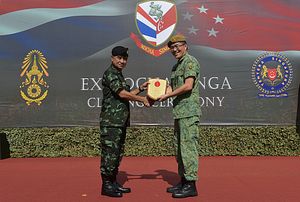Last week, Thailand and Singapore concluded the 20th iteration of their annual bilateral army exercise. The holding of the drills once again underscored the defense ties between the two Southeast Asian states amid broader domestic and regional changes underway.
As I have noted before in these pages, Singapore and Thailand have a defense relationship that includes not only traditional aspects like exchanges, visits and exercises, the Singapore Armed Forces (SAF) but also components such as a overseas training area for Singapore in Thailand, one of several arrangements that the land scarce city-state has with partners including the United States and Australia (See: “Strengthening the US-Singapore Strategic Partnership”). The two countries are also involved in multilateral interactions including the Cobra Gold exercises which Thailand hosts annually along with the United States (See: “Managing the US-Thailand Alliance in the Trump Era”).
On the army side, bilaterally, one of the key links between the Royal Thai Army and the Singapore Army has been the Kocha Singa exercise. Since 1997, the two armies have conducted the annual bilateral army exercise that includes professional interactions, combined training sessions, and a live-fire component as well. The drills have grown to comprise a range of areas, including urban operations, forest survival, counterinsurgency, and anti-explosives training.
From April 27 to May 9, the two countries held the 20th iteration of Exercise Kocha Singa in Thailand. According to Singapore’s defense ministry (MINDEF), approximately 700 troops from the 40th Battalion, Singapore Armored Regiment, Headquarters 8th Singapore Armored Brigade and the RTA’s 3rd Infantry Battalion took part in the exercise. The closing ceremony of the exercise, held at the 2nd Area Tactical Field, Korat, Thailand, was co-officiated by Chief of Army Brigadier-General Goh Si Hou and Commander-in-Chief of the RTA Chalermchai Sitthisad.
In conjunction with the exercise, Goh was also in Thailand for his introductory visit there, where, according to MINDEF, he called on several Thai officials including Deputy Defense Minister GEN Chaichan Changmongkol and Chief of Defense Force of the Royal Thai Armed Forces GEN Tarnchaiyan Srisuwan. Goh was appointed to his current position in March as part of a series of leadership changes within the Singapore military.
Last year’s iteration of Kocha Singa had seen Chalermchai make his introductory visit to Singapore in conjunction with the drills as well. That came amid a large reshuffle of hundreds of high-ranking military officers in Thailand, which has been under military rule since a coup in May 2014, with a series of election dates repeatedly postponed and delaying a return to democratic rule.
































